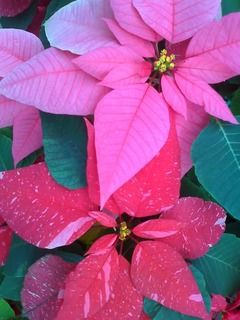
Water can be a delicate matter; poinsettias do not like to ever be too dry and never too wet. Poinsettias that get too dry quickly lose their leaves and their stems go limp. Poinsettias that sit in standing water quickly rot. Neither scenario is good; over-dry poinsettias may eventually recover, but are often very unsightly afterward. Rotten poinsettias are, well...rotten. They don't come back. To prevent over-watering, be sure to remove any decorative wrapping on the pot and don't let the plant sit in a tray of water. Water it thoroughly, so that water runs freely from the bottom of the pot. When the water stops draining, it can then be placed back in its decorative container.
There is a longstanding old wives tale that poinsettias are toxic or poisonous and dangerous to keep in a home with pets or children. It is entirely untrue. More than one poinsettia grower has been known to eat bracts in front of touring spectators to demonstrate the harmlessness of the plant. This does not mean the plant is edible; eating large quantities isn't recommended as it isn't the most digestible foliage. Due to the awful, bitter taste, it is highly unlikely that anyone, especially a small child, would venture more than a small bite. As far as pets are concerned, the ASPCA affirms that poinsettias are not poisonous, but "irritating to the mouth and stomach, sometimes causing vomiting, but generally over-rated in toxicity".


